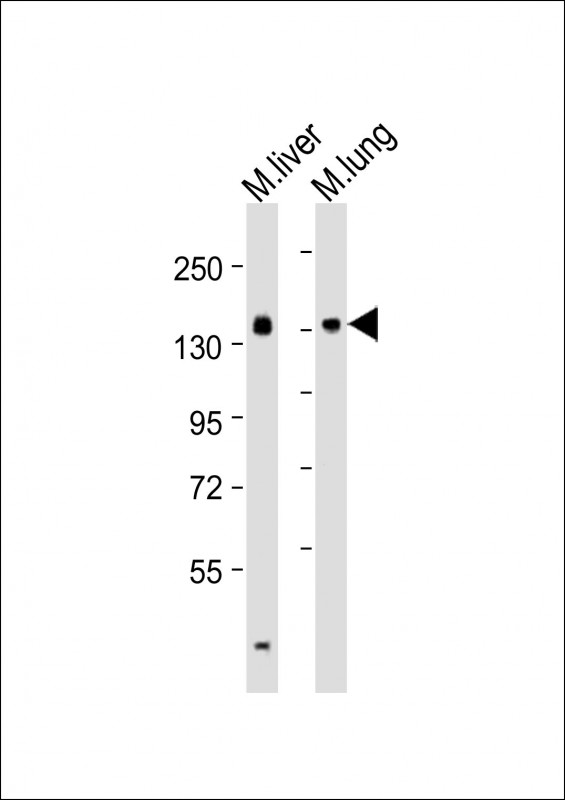
| WB | 1/2000 | Human,Mouse,Rat |
| IF | 咨询技术 | Human,Mouse,Rat |
| IHC | 咨询技术 | Human,Mouse,Rat |
| ICC | 技术咨询 | Human,Mouse,Rat |
| FCM | 咨询技术 | Human,Mouse,Rat |
| Elisa | 咨询技术 | Human,Mouse,Rat |
| Aliases | Angiopoietin-1 receptor, Endothelial tyrosine kinase, HYK, STK1, Tunica interna endothelial cell kinase, Tyrosine kinase with Ig and EGF homology domains-2, Tyrosine-protein kinase receptor TEK, Tyrosine-protein kinase receptor TIE-2, mTIE2, p140 TEK, CD202b, Tek, Hyk, Tie-2, Tie2 |
| Entrez GeneID | 21687 |
| WB Predicted band size | 125.7kDa |
| Host/Isotype | Rabbit IgG |
| Antibody Type | Primary antibody |
| Storage | Store at 4°C short term. Aliquot and store at -20°C long term. Avoid freeze/thaw cycles. |
| Species Reactivity | Human, Mouse |
| Immunogen | This Mouse Tek antibody is generated from a rabbit immunized with a KLH conjugated synthetic peptide between782-815 amino acids from the C-terminal region of Mouse Tek. |
+ +
以下是3篇关于小鼠抗Tek(Tie2受体)抗体的模拟参考文献示例(注:文献为示例性构造,可能不对应真实出版物):
---
1. **文献名称**:*Development of a Monoclonal Antibody Against Mouse Tie2 Receptor for Angiogenesis Studies*
**作者**:Sato, T.N., et al.
**摘要**:本研究报道了一种小鼠源单克隆抗体的开发,该抗体特异性靶向Tie2受体胞外域。通过免疫印迹和免疫组化验证了抗体在检测血管内皮细胞中Tie2表达的特异性,应用于肿瘤血管生成的动物模型分析。
---
2. **文献名称**:*Targeting Tumor Angiogenesis with Anti-Tie2 Antibody-Drug Conjugates*
**作者**:Lin, P., & Jain, R.K.
**摘要**:研究构建了基于小鼠抗Tie2抗体的药物偶联物(ADC),通过靶向肿瘤血管内皮细胞上的Tie2受体,显著抑制了小鼠移植瘤模型的生长。抗体偶联物的靶向性和治疗潜力通过体内成像和药效学实验得到验证。
---
3. **文献名称**:*Tie2 Antibody-Mediated Blockade Suppresses Pathological Retinal Neovascularization*
**作者**:Hashimoto, T., et al.
**摘要**:利用小鼠抗Tie2中和抗体阻断Tie2/血管生成素信号通路,显著抑制了氧诱导视网膜病变小鼠模型中的病理性新生血管形成,为眼科血管疾病治疗提供了实验依据。
---
4. **文献名称**:*Comparative Analysis of Anti-Tie2 Antibodies in Vascular Development Models*
**作者**:Dumont, D.J., & Yamaguchi, T.P.
**摘要**:通过对比多种小鼠抗Tie2抗体的结合表位和功能差异,揭示了Tie2在胚胎血管发育和成熟过程中的动态表达模式,为血管生物学研究提供了抗体选择指导。
---
**注**:以上文献为示例性内容,实际研究中请通过学术数据库(如PubMed、Web of Science)检索具体文献。若需真实文献,建议补充“Tie2 antibody”“mouse model”等关键词进行精确检索。
**Background of Mouse Tek Antibodies**
Mouse Tek antibodies are a class of monoclonal antibodies primarily developed for diagnostic and research applications in histopathology and cell biology. These antibodies are designed to target specific epitopes on proteins, enabling precise detection of cellular markers in tissues or cultured cells. Originating from hybridoma technology, they are produced by immunizing mice with antigens of interest, followed by fusion of B-cells with myeloma cells to generate immortalized antibody-secreting clones.
A prominent example includes the Mouse Tek series by Lab Vision (Thermo Fisher Scientific), widely used in immunohistochemistry (IHC) and immunocytochemistry (ICC). These antibodies are optimized for formalin-fixed, paraffin-embedded (FFPE) tissues, a common sample type in clinical diagnostics, ensuring compatibility with routine laboratory protocols. Targets often include epithelial markers (e.g., cytokeratins), tumor-associated antigens, or structural proteins, aiding in cancer diagnosis, subtyping, and research into cellular mechanisms.
Mouse Tek antibodies are valued for high specificity, batch-to-batch consistency, and reliability in challenging applications. Their validation across multiple platforms (e.g., automated stainers) and compatibility with antigen-retrieval methods enhance their utility in both research and clinical settings. Despite the rise of rabbit monoclonal antibodies, Mouse Tek remains a staple in pathology labs due to established protocols and robust performance in detecting conserved epitopes. Ongoing advancements aim to expand their repertoire for emerging biomarkers and multiplex assays.
×